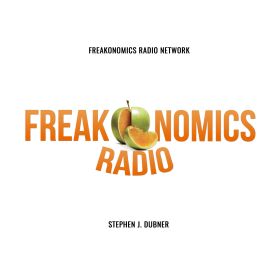
Freakonomics
Freakonomics co-author Stephen J. Dubner uncovers the hidden side of everything. Why is it safer to fly in an airplane than drive a car? How do we decide whom to marry? Why is the media so full of bad news? Also: things you never knew you wanted to know about wolves, bananas, pollution, search engines, and the quirks of human behavior.
Recent Episodes
-
The science says no, at least not in the athletic sense. But the psychic benefits can be large — just ask former N.F.L. star Ricky Williams. He says athletes should consider cannabis a healing drug, not a party drug. Even the N.F.L. is starting to agree. (Part two of a two-part series.) SOURCES:Angela Bryan, professor, associate chair for faculty development in the department of psychology and neuroscience at the University of Colorado, Boulder.Ricky Williams, former N.F.L. running back, founder of Highsman. RESOURCES:"Using A Lab On Wheels To Study Weed From Dispensaries," by Science Friday (2024)."Exercise-induced euphoria and anxiolysis do not depend on endogenous opioids in humans," by Michael Siebers, Sarah Biedermann, Laura Bindila, Beat Lutz, and Johannes Fuss (Psychoneuroendocrinology, 2021)."Endocannabinoids mediate runner’s high," by Sudhakaran Prabakaran (Science Signaling, 2015)."Cannabis and Exercise Science: A Commentary on Existing Studies and Suggestions for Future Directions," by Angela Bryan, Arielle Gilman, and Kent Hutchison (Sports Medicine, 2015).Run Ricky Run, documentary (2010). EXTRAS:"Is America Switching from Booze to Weed?" series by Freakonomics Radio (2024). Hosted by Simplecast, an AdsWizz company. See pcm.adswizz.com for information about our collection and use of personal data for advertising.
-
In sports, the rules are meant to be sacrosanct. But when it comes to performance-enhancing drugs, the slope is super-slippery. (Part one of a two-part series.) SOURCES:April Henning, associate professor of international sport management at Heriot-Watt University in Edinburgh, Scotland.Aron D'Souza, founder of the Enhanced Games.Floyd Landis, former professional cyclist, founder of Floyd's of Leadville.Louisa Thomas, staff writer at The New Yorker. RESOURCES:Doping: A Sporting History, by April Henning and Paul Dimeo (2022)."The Man Who Brought Down Lance Armstrong," by Matt Hart (The Atlantic, 2018).Cycle of Lies: The Fall of Lance Armstrong, by Juliet Macur (2014).Positively False: The Real Story of How I Won the Tour de France, by Floyd Landis (2007).Alice's Adventures in Wonderland, by Lewis Carroll (1865). EXTRAS:"Has Lance Armstrong Finally Come Clean?" by Freakonomics Radio (2018). Hosted by Simplecast, an AdsWizz company. See pcm.adswizz.com for information about our collection and use of personal data for advertising.
-
They used to be the N.F.L.’s biggest stars, with paychecks to match. Now their salaries are near the bottom, and their careers are shorter than ever. In this updated episode from 2025, we speak with an analytics guru, an agent, an economist, and some former running backs to understand why. SOURCES:Brian Burke, sports data scientist at ESPN.Roland Fryer, professor of economics at Harvard University.LeSean McCoy, former running back in the N.F.L., co-host for Fox's daily studio show, "The Facility."Robert Smith, former running back for the Minnesota Vikings, N.F.L. analyst.Robert Turbin, former running back, N.F.L. analyst for CBS Sports HQ, college football announcer.Jeffery Whitney, founder and president at The Sports & Entertainment Group. RESOURCES:"The Economics of Running Backs," by Roland Fryer (Wall Street Journal, 2024).Confessions of a Hero-Worshiper, by Stephen Dubner (2007).The Rest of the Iceberg: An Insider’s View on the World of Sports and Celebrity, by Robert Smith (2004). EXTRAS:"Roland Fryer Refuses to Lie to Black America," by Freakonomics Radio (2022)."Why Does the Most Monotonous Job in the World Pay $1 Million?" by Freakonomics Radio (2022). Hosted by Simplecast, an AdsWizz company. See pcm.adswizz.com for information about our collection and use of personal data for advertising.

